-

人教版新目标初中英语九年级下册By the time I got outside, the bus had already left教案
Ⅰ. Teaching Aims and Demands1. Knowledge Objects(1) Key Vocabularyoversleep(2) Target LanguageWhat happened?I overslept. And by the time I got up, my brother had already gotten in the shower.2. Ability Objects(1) Teach the students to use the new words.(2) Train the students to narrate past events with the Past Perfect Tense.(3) Train the students' listening and speaking skills with the target language.3. Moral ObjectIt’s a good habit to go to bed early in the evening and get up early in the morning. So you’ll never be in a hurry in the morning.Ⅱ. Teaching Key Points1. Key Vocabularyoversleep2. Target LanguageNarrate past events with the Past Perfect TenseⅢ. Teaching Difficult Points1. Train the students to narrate past events with the Past Perfect Tense.2. Train the students to understand the target language in spoken conversation.Ⅳ. Teaching Methods1. Thinking of examples from the students' real lives.2. Making sentences by looking at the pictures.Ⅴ. Teaching AidA tape recorderⅥ. Teaching ProceduresStep I Revision1. Revise the language points in Unit 8.Ask some questions like this: What volunteer work would you like to do?Help the students to answer, I’d like to…/I love to…/I hope to2. Practice the dialogue in Activity 3c on page 62 again. Get students to role play the similar dialogues with the following.

人教版新目标初中英语九年级下册Could you please tell me where the restrooms are教案
Step Ⅰ RevisionCheck homework. Ask a few students to read the article in 3a.Then ask a few students to read their guides.Step Ⅱ Part 1Look at the words in the box. Ask a student to read them. Make sure the students understand the meaning of the words. You are to fill in the blanks with the words. In some cases, students may need to use another form of the word, for example adjusting for tense or subject/ verb agreement.Ask students to fill in the blanks on their own.Check the answers. Step ⅢPart 2Go through the instructions with the class.Look at the example with the students.Ask students what the answer would be.Ask a student to read the question and answer it.Excuse me, could you tell me where the bank is, please?The bank is across the street from the shopping malt.Get students to complete the work in pairs.Check the answers. Ask a few students to read their questions.Step Ⅳ Just for Fun!Ask all the students to read the conversation. Ask: What is funny about this cartoon? Help students to explain. A Martian is a person from the planet Mars.There is no such thing as Martian food on Earth, and the clerk looks silly because he is trying to think of where there is a Martian restaurant.Invite some pairs of students to present this conversation to the rest of the class.Step Ⅴ Summary and HomeworkIn this class, we’ve done much writing practice using the key vocabulary words and the target language presented in this unit. After class, please finish the questions in 2 in your exercise books. Then finish the exercises on pages 47~48 of the workbook as well.The Seventh Period Ⅰ Teaching Aims and Demands1. Knowledge Objects(1) Key Vocabularyimage, adventure, jealousy, hero, crime, journey, brave, no longer, show interest in, take it easy, become interested in, plain looks(2)Text:Grown-ups like cartoons, too.2. Ability Objects(1) Fast-reading to get a general idea of the text.(2) Careful-reading to get the detailed information in the text.

人教版新目标初中英语九年级下册I’ll help clean up the city parks教案
Talk about offering help (P60)I’ll help clean up the city parks.A: I’d like to work ...B: You could help ...Talk about ways to tell people about the Clean-Up Day (P61)We need to ...We can’t ...I’ll ...Talk about the work the volunteers do (P62)These three students all volunteer their time to help other people.Somebody loves to ... / helps ... / plans to ... / wants to ...A: What do you like doing?B: I like ... A: What kind of volunteer work do you think I could do?B: You could ...1. 重点词汇advertisement, fix, repair, pleasure, blind, deaf, shut, carry, specially, fetch2. 认读词汇hunger, homeless, cheer, clean-up, sign, establish, major, commitment, elementary, veterinarian, coach, similar, call-in, strategy, disabled, organization, unable, support, appreciate, donation, part of speech, pronoun, adverb, preposition, conjunction, donate, Jimmy, Sally3. 词组clean up, cheer up, give out, put off, set up, think up, take after, fix up, give away, put up, hand out, work out, at once

人教版新目标初中英语九年级下册We’re trying to save the manatees教案2篇
本单元主要围绕着有关濒临灭绝的动物这一话题,学习了应该怎样保护我们的环境,以及就某一问题展开辩论。目标提示语言目标能够运用所学知识,就某一问题展开辩论。认知目标1、复习一些语法:现在进行时、一般现在时、用used to 表示一般过去时、现在完成时、一般过去时的被动语态。2、学会表达同意和不同意。3、学会以下基本句型:We’re trying to save the manatees.Manatees eat about 100 pounds of food a day.There used to be a lot of manatees.In 1972,it was discovered that they were endangered.Some of the swamps have become polluted.情感目标了解一些濒临灭绝的动物的生活习性和濒临灭绝的原因,教育学生应该如何保护环境。教学提示充分利用多媒体等教学设备,创设与本课话题相关的情境,如各种不同种类的动物、动物园以及有关环境的画画等等。围绕着本单元的教学目标,设计一些贴近学生实际的教学任务,如让学生谈论自己最喜欢的动物,如何拯救濒危动物,如何保护环境等等。让学生根据所学知识,就动物园是否对动物有利以及其他的话题进行辩论。

人教版新目标初中英语九年级下册You’re supposed to shake hands教案
教学目标:1. 掌握本单元一些重点词汇的写法和用法。2. 学会自如谈论餐桌礼仪。Step 1 RevisionAsk some students to retell the customs at the table in France in the passage in 3a.Step 2 Self checkPart 1. Fill in each bland with the correct word given. Students do the exercises by themselves at first. Then check the answers. Ask the students to comprehend the sentences and help them point out uses of some words, like “arrive (at / in) sw., spend time / money on sth , spend time / money (in) doing sth.”Part 2. Read about Fan Ling’s experience in a western restaurant. Understand the passage. Point out some key points in the passage.1. be / get used to doing sth. 习惯做某事2. begin with = start with 以….开头3. crowd v. 挤满,塞满 the crowd 人群 crowded adj. 拥挤的Then students discuss about how she would solve her problem. Ask some to share their stories with others.Part 3. Complete the crossword by looking at the sentences on the left. Then check the answers.

人教版新目标初中英语七年级下册How was your weekend教案2篇
Teaching Goal:1. General aims:Talk about recent past events2. Particular aims:A. Language Focus.Talk about recent past events and think of the past events.B. Language goalsHow was….?It was …What did …do over the weekend?C. Language structures:(1). How was your weekend? I was great. Pay attention to no form.(2). What did you do over the weekend? I played soccer. We went to the beach.D. Useful words and phrases:Words: was, did, went, beach, over, project, test, wasn’t, false, number, geography, spend, week, most, mixture, their, had, little, cook, read, saw, change, everyone, sit, sat, no, anythingPhrases: did one’s homework, played soccer, cleaned my room, went to the beach, played tennis, went to the movies, on Saturday morning, over the weekend, cook … for, what about, do some reading, have a party, talk show, go shoppingE. Grammar language:Present simple past tenseRegular and irregular verbsF. Learning strategies:Tour and holidaysG. Interdiscipinary:H. Emotion and manner:Teaching time: 5 periodsTeaching procedures:Period One教学步骤、时间 教师活动 学生活动 媒体应用Step 1Free talk 3’ Ask some questions like:Who’s on duty today?What’s the weather like? Answer and talk about something.让同学们回答下列问题1. Do you like weekend? (Let some students answer)It takes them three minutes to talk about the question.2. Why do you like weekend? (let the students answer) Most of the students like the weekend此时教师用汉语问:“在周末期间问你干了什么?这句话用英语这么回答?Let the students guess.At last the teacher give them right answer3. What did you do over the weekend?(板书、学习)
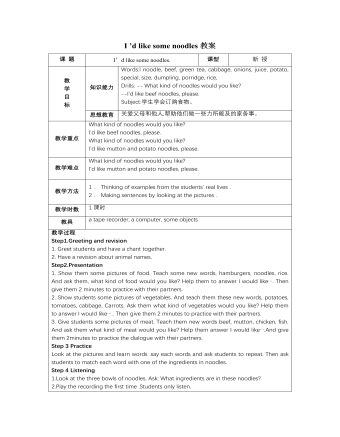
人教版新目标初中英语七年级下册I ’d like some noodles教案
教学过程Step 1: warming-up Sing a song---------“food and drink” Step 2: Revision1 Dictation2 Revise: What kind of noodles would you like?I’d like …What size bowl of noodles would you like?I’d like…Step 3: Presentation1 show pictures of food, ask students say the words.2 Students read the newspaper ad in 3a. Fill in blanks with words in the box. Then read the ad together, the teacher explains some difficult language points.3 Check the answers Step 4 PracticeAsk students to finish 3b in the same way according to 3a. Students read the short passage and fill in the blanks .At last, check the answers.Step 5 productionAsk students to write their own ad for dumplings, noodles, drinks, and other foods they know. Then ask students to read their partner’s ad. Then order food and drink from their partner.Step 6 Home workGroup work – make an ad about “food and drink”
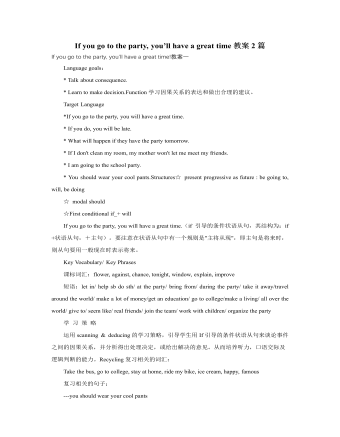
人教版新目标初中英语八年级下册If you go to the party, you’ll have a great time教案2篇
区分宾语从句、定于从句和状语从句宾语从句和状语从句,都叫做主从复合句。宾语从句主要是中考必考的,是初中阶段必掌握的从句,宾语从句主要是掌握三要素,所谓宾语从句,就是宾语在主从复合句当中充当宾语的一个句子,叫做宾语从句。主句的谓语动词是及物动词,后面如果是词或者是短语的话,是简单句,如果是句子的话,肯定是宾语从句。I know that he good at English.就是宾语从句,三要素,一要素是要注意连词,连词一共学了三类连词,一类连词是that口语当中可以省略,就像刚才说的那一句,I hear he is good at English.还有疑问代词、疑问副词,how where when,疑问代词、疑问副词。还有一类连词weather是否的意思,不是状语从句当中的如果,这一定要和如果区分开,这是是否。I don't know if he interested at English。宾语从句要注意if是连词。第二要素是语序,要用陈述举语序。比如说你家有几口人,我们都说How many people are there in you family?但是这是简单句,一旦说成宾语从句,你可以告诉我你家有几口人吗?Could you tell me how many people there are in you family ?
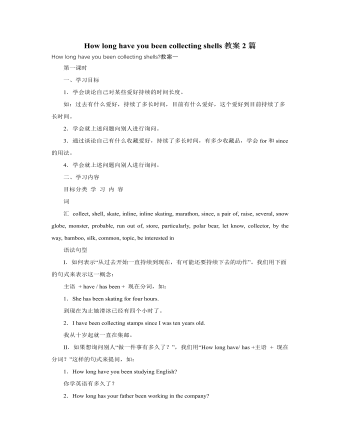
人教版新目标初中英语八年级下册How long have you been collecting shells教案2篇
Step Ⅱ Show the new words on the screen and teach the new words. Read the new words to students and ask them to repeat.Step Ⅲ 3aThis activity introduces new vocabulary and provides reading practice using the target language.In this activity first look at the four pictures.T: What can you see in the pictures?Ss: Four snow globes.T: Right. There are four snow globes in the pictures. And what are they?Ss: They are a monster, two polar bears, two penguins and a birthday cake.Write these words on the blackboard: snow globe; monster; polar bear; penguin and birthday cake. Read them to the class and ask students to repeat each one. Make sure students understand each word.Use a computer to show the E-mail message on the screen and read the message to students.Get students to read the e-mail on their own, and then draw lines connecting each snow globe and its description.Correct the answers.AnswersA line should connect each snow globe picture with the words that describe it in the letter.Step Ⅳ 3bThis activity provides writing practice using the target language.First review Activity 2a on Page 47.Then ask students to complete the message according to Activity 2a.Some partial sentences are given to students. Write about one person's collection.When students work, walk around the room checking the progress and offering help as needed.When they finish, ask some students to read their messages to the class.

人教版新目标初中英语九年级下册Rainy days make me sad教案
1. 教材分析本单元以how do things affect you?为话题, 从颜色、天气、音乐、广告、产品等方面谈论了外界事物如何影响人的心情。要求学生掌握表达某物或某事给人带来的感觉、看法或影响等。共设计了四个部分的内容:Section A 该部分有4个模块:第一模块围绕Which restaurant would you like to go to?这一话题展开思维(1a)、听力(1b)、口语(1c)训练;第二模块围绕How does music affect you? 进行听力(2a-2b)、口语训练(2c);第三模块继续围绕how do colors in the restaurant affect you这一话题展开训练,训练形式为阅读和问题体验(3a)和小组活动(3b);第四模块仍就How do things affect you这一话题以调查的形式展开讨论。Section B该部分有4个模块:第一模块围绕产品广告对人们的影响这一话题以“配对”(1a)与“列举”(1b)两种形式展开训练;第二模块继续围绕How do things affect you? 进行听力(2a-2b)、口语对话训练(2c);第三模块围绕“Advertising”这一话题展开阅读(3a-3b)和写作(3c)训练;第四模块围绕How posters affect you这一话题以口语训练形式展开小组活动。

人教版新目标初中英语八年级下册What were you doing when the UFO arrived教案2篇
(一).知识方面: 1.培养学生能运用过去进行时来描述、谈论过去某个时间正在发生的事情或动作的意识和能力,能就过去某个时间正在发生的动作做出正确的描述。 2.培养学生的想象力和角色扮演的合作能力。 3.培养学生讲述过去发生的事情经过的能力。能正确运用一般过去时来讲述故事。 (二).技能方面: 1.本单元的语言目标是Talk about past events and tell a story(谈论过去的时间和讲述一个故事),围绕这一目标,要涉及句型: What were you doing when the UFO arrived? ----I was sitting in the barber’s chair. The barber was cutting my hair. 因此必须学习standing、studying、cleaning、sleeping、cooking、making、eating、cutting、等表示地点的词,以便为上述句型提供语言材料。2.学习过去进行时的有关知识。Was/were+现在分词,是该时态的表达式。 3.在学习过程中,要区分The boy was walking down the street when the UFO landed.和While the boy was walking down the street, the UFO landed.这两种由when和while引导的状语从句的句型结构。注意它们的不同。
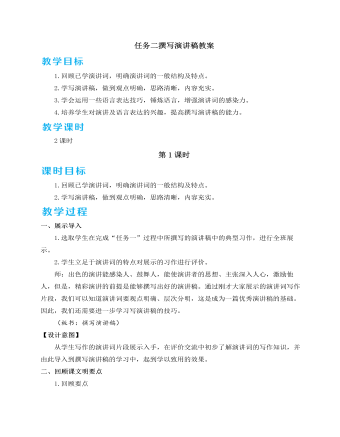
人教部编版语文八年级下册任务二撰写演讲稿教案
[乙]爱是人世间最完美的一种情感,爱就像一缕冬日里的阳光,能让饥寒交迫的人感到温暖;爱就像一泓沙漠中的清泉,能使濒临绝境的人看到希望;爱就像一盏黑暗中的路灯,能让迷惘的人找到方向。我们要让爱永驻心中,哪怕只是对父母的一句“我爱你们”、对朋友的一句“加油”、对摔倒老人的一次伸手。多一份行动,多一份传递,多一种信念,尽自己的微薄之力去帮助他人,回报社会,让爱的种子飞得更远更广,永远地扎根于人们的心中!(生交流讨论)预设 乙结尾运用了比喻、排比等修辞手法,语言更加生动,富于表现力,尤其是排比句的运用,使得句式整齐、有气势,情感表达有感染力。另外,结尾段不断重申观点,也起到了加深听众印象的效果。师:除了运用修辞手法之外,根据演讲稿的特点,我们还可以从哪些方面锤炼语言来增强演讲的表达效果呢?(生结合演讲稿的特点,讨论交流)预设 (1)运用一些口语、大众化的语言,拉近与听众的距离。(2)多用短句,少用结构复杂的长句,使语意清晰,简短易懂。
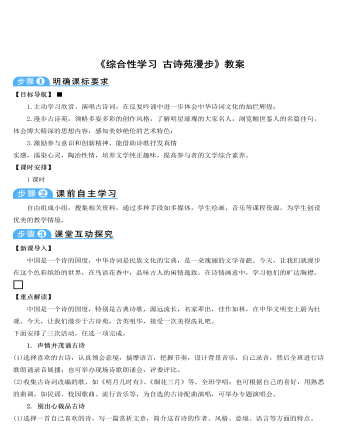
部编版语文八年级下册《综合性学习:古诗苑漫步》教案
【目标导航】1.主动学习欣赏、演唱古诗词,在反复吟诵中进一步体会中华诗词文化的灿烂辉煌;2.漫步古诗苑,领略多姿多彩的创作风格,了解明星璀璨的大家名人,浏览醒世鉴人的名篇佳句,体会博大精深的思想内容,感知美妙绝伦的艺术特色;3.激励参与意识和创新精神,能借助诗歌抒发真情实感,濡染心灵,陶冶性情,培养文学纯正趣味,提高参与者的文学综合素养。【课时安排】1课时自由组成小组,搜集相关资料,通过多种手段如多媒体,学生绘画,音乐等课程资源,为学生创设优美的教学情境。【新课导入】中国是一个诗的国度,中华诗词是民族文化的宝典,是一朵瑰丽的文学奇葩。今天,让我们就漫步在这个色彩缤纷的世界,在鸟语花香中,品味古人的闲情逸致,在诗情画意中,学习他们的旷达胸襟。
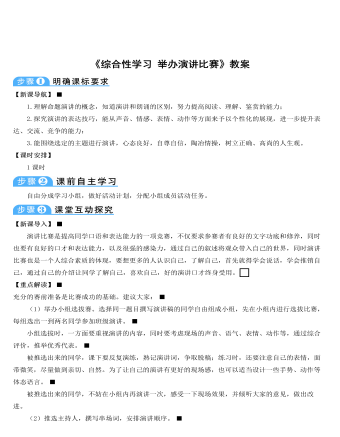
部编版语文八年级下册《综合性学习:举办演讲比赛》教案
【新课导入】演讲比赛是提高同学口语和表达能力的一项竞赛,不仅要求参赛者有良好的文字功底和修养,同时也要有良好的口才和表达能力,以及很强的感染力,通过自己的叙述将观众带入自己的世界,同时演讲比赛也是一个人综合素质的体现,要想更多的人认识自己,了解自己,首先就得学会说话,学会推销自己,通过自己的介绍让同学了解自己,喜欢自己,好的演讲口才终身受用。【重点解读】充分的赛前准备是比赛成功的基础。建议大家:(1)举办小组选拔赛。选择同一题目撰写演讲稿的同学自由组成小组,先在小组内进行选拔比赛,每组选出一到两名同学参加班级演讲。小组选拔时,一方面要重视演讲的内容,同时要考虑现场的声音、语气、表情、动作等,通过综合评价,推举优秀代表。
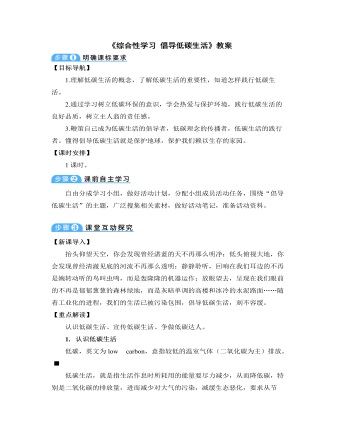
部编版语文八年级下册《综合性学习:倡导低碳生活》教案
【新课导入】抬头仰望天空,你会发现曾经湛蓝的天不再那么明净;低头俯视大地,你会发现曾经清澈见底的河流不再那么透明;静静聆听,回响在我们耳边的不再是婉转动听的鸟叫虫鸣,而是轰隆隆的机器运作;放眼望去,呈现在我们眼前的不再是郁郁葱葱的森林绿地,而是灰暗单调的高楼和冰冷的水泥路面……随着工业化的进程,我们的生活已被污染包围,倡导低碳生活,刻不容缓。【重点解读】认识低碳生活、宣传低碳生活、争做低碳达人。1. 认识低碳生活低碳,英文为low carbon,意指较低的温室气体(二氧化碳为主)排放。低碳生活,就是指生活作息时所耗用的能量要尽力减少,从而降低碳,特别是二氧化碳的排放量,进而减少对大气的污染,减缓生态恶化,要求从节水、节电、节气和回收四个环节来改变生活细节。
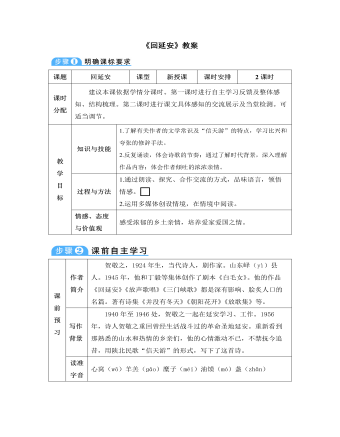
部编版语文八年级下册《回延安》教案
【初读课文,整体感知】1.诗歌共分为五小节,这五小节分别写了什么内容?第一小节:阔别十年重回延安;第二小节:追忆当年战斗生活;第三小节:亲人相见话延安;第四小节:喜看延安今繁华;第五小节:颂延安光辉历史。2.试想想诗人写作这首诗抒发思想情感的线索是什么?讨论、明确:全诗以诗人离别10年后重返延安的所见所闻所想为线索。【细读课文,仔细品味】1.作者在第一节中是怎样通过一系列动词表现情感的?“抓”“贴”等逼真的动作,表现了诗人回到延安时的激动情景。“双手搂定宝塔山”的“搂”字,写尽了作者对延安的怀念。“唱”“笑”“招”具有拟人的色彩,渲染了欢乐的气氛。最后一个“扑”字,强烈、准确地表达出作者的想念。2.第二节中,“二十里铺送过柳林铺迎,分别十年又回家中”在结构上有什么作用?
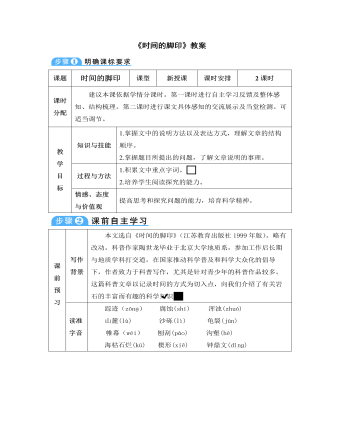
部编版语文八年级下册《时间的脚印》教案
【初读课文,整体感知】1. 以《时间的脚印》为题目有什么好处?文章的题目《时间的脚印》,是从高士其《时间伯伯》一诗中引申借用来的。其拟人化手法的运用,形象地说明了那些形形色色、大大小小的岩石中都潜藏着时间的踪影,以引起人们的探究欲望和阅读兴趣。【再读课文,梳理结构】1.第一部分(第1至第4自然段)说明岩石“是记录时间的方式中最重要的一种”。2.第二部分(第5至第29自然段)分层次地详细说明岩石是怎样记录时间的。这部分分三层。3.第三部分(第30自然段至全文完)总结全文,说明岩石记录时间的意义,号召人们进一步去大自然找寻时间的踪影,去一步步走向地下的宝库。【感悟精彩句子】1.“狂风来了,洪水来了,冰河爬来了”。
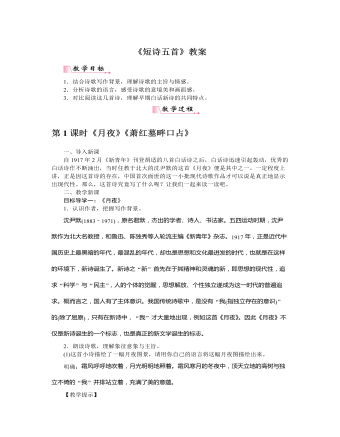
部编版语文九年级下册《短诗五首》教案
明确:“卷”“奔”这两个动词极为生动,描绘出了“大地”的动荡、不安定和被裹挟着的颇有气势的冲过来的动态。(2)诗歌之中的“风”“雨”仅指自然界的风雨吗?还有什么象征意义?“大地”又有什么深层内涵?明确:它们不仅仅是指自然界中的风雨,对于“我”这样一个“年轻”没有人生阅历与生活经验的“舵手”来说,它们也象征着人生的坎坷与遭遇。这首诗作于二十世纪三十年代,这里遭受“风雨”侵袭的“大地”指的是当时风雨如晦的中国局势。这样来说,“风雨”又有了一层更深层次的含义:当时的中国社会所承受的苦难。(3)面对这样的“大地”,“我”又是一个怎样的形象?明确:“我”作为一个有志向的敢于像舵手一样乘风破浪的有为青年,面对苦难中的祖国,产生了强烈责任感、使命感与对中国社会前途、对民族命运的深深的担忧。
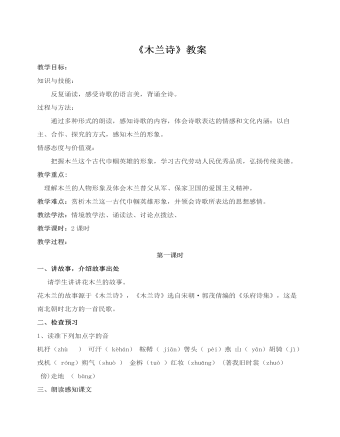
部编版语文七年级下册《木兰诗》教案
七、分析木兰形象既有女儿情怀 更具英雄气概古代杰出的巾帼英雄形象奇女子 普通人既是 巾帼英雄 又是 平民少女矫健的勇士 娇美的女儿品质勤劳善良又坚毅勇敢 淳厚朴实又机敏活泼 热爱亲人又报效国家 不慕高官厚禄而热爱和平生活八、探究写法诗中哪些地方写得详细?哪些地言写得简略?这样写有什么好处?从军缘由——详写出征前的准备——略写出征中的思亲心理——详写关山飞度,征战沙场——略写 详写女儿情态略写英雄气概凯旋辞官——详写家人迎接——详写木兰改装——详写1(在内容上)突出木兰的儿女情态,丰富了木兰的英雄性格,使得人物形象真实感人。2(在结构上)详略得当,使全诗显得简洁紧凑。繁简安排有详有略起到了突出人物特征 突出对木兰的孝敬父母、勇于担当重任的性格的颂扬
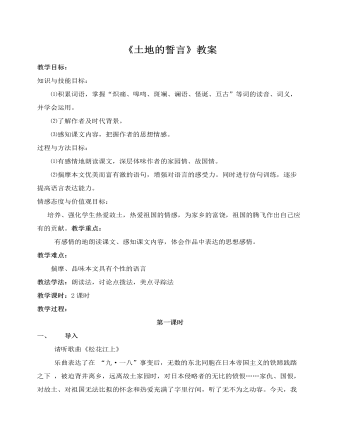
部编版语文七年级下册《土地的誓言》教案
抒情句子1、对于广大的关东原野,我心里怀着炽痛的热爱。我无时无刻不听见……因为我常常感到它在泛滥着一种热情。 2、我总是被这种声音所缠绕,……我都会突然想到是我应该回去的时候了。3、在故乡的土地上,我印下我无数的脚印。在那田垄里埋葬过我的欢笑。 ……在那沉重的镐头上留着我的手印。2、怎样理解文中的“我常常感到它在泛滥着一种热情”中的“泛滥”与“在那田垄里埋葬过我的欢笑”中的“埋葬”这两个词语的确切含义?“泛滥”原意是“江河水溢出,淹没土地”,又引申为“思想、事物到处扩散”。这里用 “泛滥”表达了作者的心情正如决堤之水不可遏抑地向四下泛滥奔流,作者那激愤狂放的心情用了“泛滥”来形容较之用“澎湃”“涌动”更多了几分野性和难以驾驭的力量。`


